Africa-Press – Mozambique. The South African paper, the “Daily Maverick” has accused the consultancy and audit company Ernst and Young (EY) of a conflict of interest in its role in the scandal of Mozambique’s “hidden debts”.
This term refers to the loans, in 2013 and 2014, of over two billion US dollars granted by the banks Credit Suisse and VTB of Russia to three fraudulent, security-linked Mozambican companies, Proindicus, Ematum (Mozambique Tuna Company) and MAM (Mozambique Asset Management).
The negotiations leading up to the loans involved at least three corrupt officials from Credit Suisse, who have admitted to taking bribes, and officials of the Abu Dhabi group, Privinvest, . Between them, they ensured that the Mozambican government of the day, led by the then President Armando Guebuza, issued illegal loan guarantees, covering the entire two billion dollars.
The effect of the guarantees was that, if the companies defaulted (as they have done), then the Mozambican government would be held liable for repaying the loans. But the guarantees violated the budget laws of 2013 and 2014 and the Mozambican constitution. The loans and their guarantees have been declared unconstitutional by the Constitutional Council, Mozambique’s highest body in matters of constitutional law.
EY enters this saga, because it was contracted by the Mozambican government to conduct an audit of Ematum’s financial statements for 2013 and 2014. But EY had a second role: in 2016, when it was clear that the loans could not be repaid, EY and the state owned Natonal Investment Bank (BNI) were paid 17.3 million dollars to advise on restructuring the Ematum debt.
The “Daily Maverick” comments that “EY’s dual role as both auditor of Ematum and as an adviser on the bond restructuring raises serious questions over its role in the scandal and how conflicts of interest in the audit profession undermine audit quality and may facilitate corruption”.
“EY’s role as Ematum’s independent auditor meant it had the legal responsibility to take a balanced and fair view of the financial health of Ematum, and if warranted, raise the alarm over any potential corruption risks”, the paper added. “Yet despite Ematum’s financial statements exhibiting several major corruption red flags and being littered with irregularities, EY did not flag them. Arguably, EY had a strong incentive to keep quiet because it was at the same time jostling to offer lucrative consultancy services to the same client, in this case, the Mozambican government”.
In 2017, the Attorney-General’s Office (PGR) hired the company Kroll to carry out a forensic audit of Ematum, Proindicus and MAM. Kroll, the “Daily Maverick” noted, “uncovered highly irregular and suspicious business practices, undisclosed bank accounts and several other corruption red flags that auditors such as EY are required to inspect further during their audits”.
Thus, Ematum’s income in 2013 was recorded as 3,049,084 dollars, but only 14,268 dollars came from fishing revenues with three million coming from an unexplained loan from an Ematum supplier, Logistics International (part of the Privinvest group). A further 1.2-million dollars from the same supplier was sent to Ematum in December 2014. Yet Kroll noted that the corresponding supply contracts made no mention of such amounts for operational expenses.
Perhaps the most glaring problem, picked up by Kroll, but not by EY, was the shoddy nature of the Ematum contract and invoices. The “Daily Maverick” notes that “the Ematum supply contract examined by Kroll (worth 635,582,800 dollars) ran to just one page… With the support of an independent expert, Kroll estimates that the price discrepancy between the prices of the assets as stated in the invoices provided to Ematum by the contractor (ie Privinvest), and the prices estimated by Kroll’s independent expert amount to $647,478,000”.
Kroll believed that the lack of detail on the invoices and the general standard of Ematum’s bookkeeping seemed to be in violation of the Mozambican legal requirement to keep accurate documentation. EY was supposed to audit Ematum for the 2015 and 2016 financial years as well, but could not finish these audits, precisely because of a lack of documentation.
According to the Mozambican government, in proceedings launched at the UK High Court in London, EY prepared a five-year business plan for Ematum in September 2015, claiming that with appropriate support from the Mozambican government and with changes to its revenue and debt obligation, Ematum’s business was “viable”.
The “Daily Maverick” remarks “it is unclear how EY could consider Ematum – which was just months from a default on its loans and had no tuna fleet or revenues – could have possibly been a viable business. How did EY’s consultants come to this conclusion? Were they placing profit over their professional duties, securing the business of advising the government at the expense of their professional duties?”
EY has kept quiet about its role in the hidden debts scandal, and the “Daily Maverick” notes “Firms like EY have a strong monopoly on public contracts and face little consequence for poor behaviour and misconduct. Until governments take a tougher line with the audit firms, we will continue to see them signing off on the accounts of companies involved in corruption and other forms of misconduct”.






